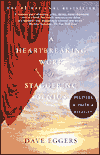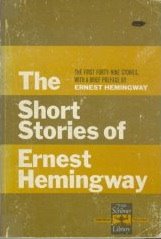 I first heard about Dave Eggers two years ago. His book was big news at the time, but I neglected to read it. He re-entered my memory when I read an article about 826LA, a sister center of 826 Valencia that tutors children on writing fiction and creative non-fiction for free. He founded 826, is an editor of edgy, humorous, and entertaining McSweeney's, and is an amazing writer.
I first heard about Dave Eggers two years ago. His book was big news at the time, but I neglected to read it. He re-entered my memory when I read an article about 826LA, a sister center of 826 Valencia that tutors children on writing fiction and creative non-fiction for free. He founded 826, is an editor of edgy, humorous, and entertaining McSweeney's, and is an amazing writer.The book has been on my shelf for a year and a half. I picked it up a couple of weeks ago to give it a go, to see what all the hype was, to make my own judgment. Eggers is talented, that's for sure. He can make you laugh or cry or anything in between. His writing is fleeting and enthusiastic and dark and depressing all in one fell swoop. "Heartbreaking Work of Staggering Genius" tells of his struggle to cope with the death of his parents while raising his brother Toph, only 15 years his junior. It's far from a perfect book, but what is? The story is inherently touching; any reader must exude admiration for the painstaking life Eggers has led, the amount of responsibility he took on and the courage to describe it honestly (sometimes humorously) for the world (us readers) to pick apart as I am doing right now. In McSweeney's fashion, Eggers has a preface with parts of the book to skip and a lengthy acknowledgements section outlining themes of the book, disclaimers on sex in the book (one section details how several nude scenes were omitted), and an outline of the amount of money it Eggers made from the book. And while funny, it's a bit trying. And even though he wrote that it's okay to just skip over the preface and acknowledgement section, I can't, because I have to read every word. So it got a bit self-indulgent, a tad annoying, but just when I had the book cocked back ready to throw across the room the story started and I was on this whirlwind rollercoaster of disbelief and failure and brotherhood and love. And it paid off.
The cover's pretty. I like the red curtain pulling back from the sun. Red. Like the world's a show or something.



